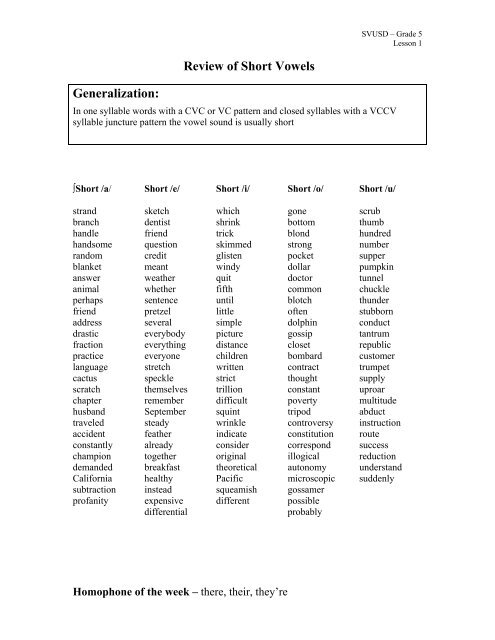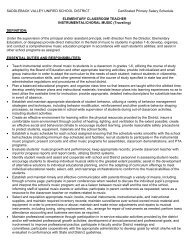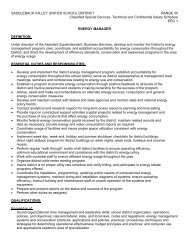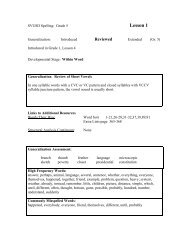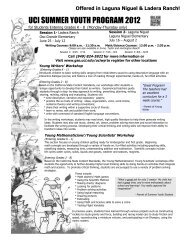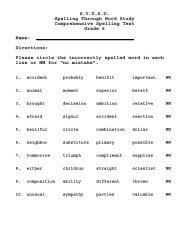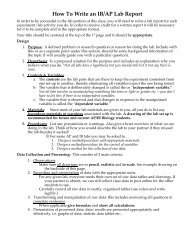Review of Short Vowels Generalization:
Review of Short Vowels Generalization:
Review of Short Vowels Generalization:
Create successful ePaper yourself
Turn your PDF publications into a flip-book with our unique Google optimized e-Paper software.
SVUSD – Grade 5<br />
Lesson 1<br />
<strong>Generalization</strong>:<br />
<strong>Review</strong> <strong>of</strong> <strong>Short</strong> <strong>Vowels</strong><br />
In one syllable words with a CVC or VC pattern and closed syllables with a VCCV<br />
syllable juncture pattern the vowel sound is usually short<br />
∫<strong>Short</strong> /a/ <strong>Short</strong> /e/ <strong>Short</strong> /i/ <strong>Short</strong> /o/ <strong>Short</strong> /u/<br />
strand sketch which gone scrub<br />
branch dentist shrink bottom thumb<br />
handle friend trick blond hundred<br />
handsome question skimmed strong number<br />
random credit glisten pocket supper<br />
blanket meant windy dollar pumpkin<br />
answer weather quit doctor tunnel<br />
animal whether fifth common chuckle<br />
perhaps sentence until blotch thunder<br />
friend pretzel little <strong>of</strong>ten stubborn<br />
address several simple dolphin conduct<br />
drastic everybody picture gossip tantrum<br />
fraction everything distance closet republic<br />
practice everyone children bombard customer<br />
language stretch written contract trumpet<br />
cactus speckle strict thought supply<br />
scratch themselves trillion constant uproar<br />
chapter remember difficult poverty multitude<br />
husband September squint tripod abduct<br />
traveled steady wrinkle controversy instruction<br />
accident feather indicate constitution route<br />
constantly already consider correspond success<br />
champion together original illogical reduction<br />
demanded breakfast theoretical autonomy understand<br />
California healthy Pacific microscopic suddenly<br />
subtraction instead squeamish gossamer<br />
pr<strong>of</strong>anity expensive different possible<br />
differential<br />
probably<br />
Homophone <strong>of</strong> the week – there, their, they’re
SVUSD – Grade 5<br />
Lesson 2<br />
<strong>Generalization</strong>:<br />
<strong>Review</strong> <strong>of</strong> Long <strong>Vowels</strong><br />
Long vowel sounds are those that produce the sound <strong>of</strong> the letter’s name as in make, read,<br />
bike, boat, tune. Syllables with long vowel sounds are <strong>of</strong>ten marked by two vowels and<br />
usually follow a CVCe or a VCV pattern. Open syllables with a V/CV juncture produce a<br />
long vowel sound.<br />
Long /a/<br />
Long /e/<br />
range these retrieve<br />
phase theme because<br />
strange before feasible<br />
behave wheel comedian<br />
break asleep decided<br />
maybe<br />
between<br />
change<br />
meter<br />
great<br />
secret<br />
remain<br />
fever<br />
afraid<br />
compete<br />
straight<br />
degrees<br />
quaint<br />
teacher<br />
remain<br />
treason<br />
nature<br />
complete<br />
nation<br />
really<br />
navy<br />
either<br />
stray<br />
leaves<br />
display<br />
least<br />
crayon<br />
increase<br />
raven<br />
breathe<br />
fable<br />
kneading<br />
Wednesday<br />
piece<br />
sleigh<br />
shriek<br />
glacier<br />
believe<br />
prey<br />
relief<br />
they<br />
achievement<br />
Homophone <strong>of</strong> the week – root, route
SVUSD – Grade 5<br />
Lesson 3<br />
<strong>Generalization</strong>:<br />
<strong>Review</strong> <strong>of</strong> Long Vowel Sounds<br />
long /i/, /o/, /u/<br />
Long vowel sounds are those that produce the sound <strong>of</strong> the letter’s name as in make, read,<br />
bike, boat, tune. Syllables with long vowel sounds are <strong>of</strong>ten marked by two vowels and<br />
usually follow a CVCe or a VCV pattern. Open syllables with a V/CV juncture produce a<br />
long vowel sound.<br />
Long /1/ Long /o/ Long /u/<br />
die chose use<br />
bye stroke huge<br />
style quote confuse<br />
strike clothes compute<br />
crime remote amuse<br />
prize enclose include<br />
write globe cruise<br />
while suppose volume<br />
light follow molecule<br />
idea know juice<br />
size both bruise<br />
pilot doe shrewd<br />
arrive coach strewn<br />
quite grown music<br />
tighten throat Tuesday<br />
silent approach rumor<br />
combine growth human<br />
describe hollow instrument<br />
surprise throw school<br />
admire solar choose<br />
exercise ocean smoothly<br />
disguise notice cruel<br />
height rotate fooled<br />
Homophone <strong>of</strong> the week – weather, whether
SVUSD – Grade 5<br />
Lesson 4<br />
<strong>Generalization</strong>:<br />
Words with the /j/ sound<br />
When the /j/ sound at the beginning <strong>of</strong> a word or syllable is followed by e, i. or y (ginger,<br />
gypsum) the sound is represented by the consonant g. When the /j/ sound follows a long<br />
vowel sound (cage) it is represented by the letters –ge. When the /j/ sound follows a short<br />
vowel sound (lodge) it is represented by the letters –dge.<br />
g- -ge -dge<br />
giant stage edge<br />
ginger rage bridge<br />
gem page fudge<br />
gym range badge<br />
logic savage ledge<br />
agile gauge ridge<br />
fragile strange dodge<br />
margin oblige trudge<br />
imagine agent pledge<br />
gypsy change abridge<br />
grungy strange knowledge<br />
longitude<br />
siege<br />
legible<br />
bulge<br />
gigantic<br />
magician<br />
engineer<br />
eligible<br />
legitimate<br />
gigantic<br />
hygiene<br />
gymnastics<br />
apology<br />
religion<br />
original<br />
legislature<br />
Homophone <strong>of</strong> the week – wrote, rote
SVUSD – Grade 5<br />
Lesson 5<br />
Diphthongs for the /oi/ Sound in Two Syllable Words<br />
<strong>Generalization</strong>:<br />
A diphthong is the sound produced by one vowel gliding into another and is represented<br />
by two vowels (ou, oi, oy, ow). Diphthongs can be in open and closed syllables (royal,<br />
moisture), and in stressed and unstressed syllables (counter, annoy).<br />
oi oy ou ow<br />
moisture boycott council allow<br />
appoint royal about brownie<br />
broiler annoy outline power<br />
poison enjoy county vowel<br />
pointless loyal amount shower<br />
moisten employ countdown coward<br />
rejoice soybean counter drowsy<br />
avoid voyage abound prowler<br />
devoid destroy lousy browsing<br />
turquoise oyster arouse chowder<br />
ointment employee mountain<br />
joyous<br />
announce<br />
bounty<br />
mouthful<br />
Homophone <strong>of</strong> the week – shone, shown
SVUSD – Grade 5<br />
Lesson 6<br />
<strong>Generalization</strong>:<br />
Compound Words<br />
A compound word is a word formed from two or more smaller words. The meaning <strong>of</strong> a<br />
compound word is related to the meaning <strong>of</strong> the smaller words within it.<br />
There are three types <strong>of</strong> compound words:<br />
•closed: the smaller words form one whole word (baseball)<br />
•open: the smaller words are separated by a space (milk shake)<br />
•hyphenated: the smaller words are joined by a hyphen (twenty-five)<br />
Infrequently, a letter may be dropped in forming a compound word (almost, also).<br />
Do not leave out a letter when the last and beginning letters <strong>of</strong> the smaller words are the<br />
same (roommate)<br />
Closed Open Hyphenated<br />
highway first aid brand-new<br />
weekend high school forty-four<br />
volleyball<br />
ninety-nine<br />
touchdown<br />
make-believe<br />
classmate<br />
first-rate<br />
Thanksgiving<br />
cold-blooded<br />
wheelchair<br />
brother-in-law<br />
salesperson<br />
merry-go-round<br />
firecracker<br />
twenty-one<br />
granddaughter<br />
good-bye<br />
skyscraper<br />
cold-blooded<br />
whereabouts<br />
basketball<br />
chalkboard<br />
broadcast<br />
counterclockwise<br />
hitchhiker<br />
everybody<br />
Homophone <strong>of</strong> the week - ring, wring
SVUSD – Grade 5<br />
Lesson 7<br />
<strong>Generalization</strong>:<br />
Plurals<br />
The most common way to form a plural is to add ‘s’ to the singular form <strong>of</strong> the noun. In<br />
words that end with consonant-‘y’, change ‘y’ to ‘i’ and then add ‘es’.<br />
Plurals are formed with vowel-y words by adding ‘s’<br />
change y to i change f to v add es changes sis to<br />
ses<br />
cities halves heroes crisis<br />
ladies lives tomatoes parentheses<br />
bodies selves potatoes hypotheses<br />
replies knives eschoes<br />
skies wolves volcanoes<br />
families calves vetoes change um to a<br />
counties scarves<br />
countries<br />
data<br />
memories<br />
media<br />
replies vowel-y change a to ae millennia<br />
supplies<br />
bacteria<br />
colonies turkeys larvae<br />
enemies valleys vertebrae<br />
liberties monkeys algae Change us to i<br />
libraries holidays<br />
rivalries journeys cacti<br />
strategies<br />
dictionaries<br />
radii<br />
fungi<br />
nuclei<br />
stimuli<br />
alumni<br />
Homophone <strong>of</strong> the week – too, to, two
SVUSD – Grade 5<br />
Lesson 8<br />
<strong>Review</strong> <strong>of</strong> Open and Closed Syllables VCCV and VCV<br />
<strong>Generalization</strong>:<br />
Open syllables typically end with a long vowel sound.<br />
Closed syllables end with a consonant and have a short vowel sound.<br />
The syllable break (juncture) in VCCV spelling patterns occurs between the two<br />
consonants (sur-vive, ap-pear). The syllable juncture in VCV spelling patterns is<br />
sometimes before the consonant and sometimes after depending on whether the syllable<br />
is open (bro-ken) or closed (wag-on).<br />
VCCV VCCV VCV VCV<br />
two consonants double consonants open syllable closed syllable<br />
expert funny nature robin<br />
until happen student never<br />
canyon pretty because limit<br />
chapter gossip music column<br />
compass mattress enough shrivel<br />
costume tissue beyond vanish<br />
rescue commit beneath level<br />
fancy essay finer stomach<br />
distant giggle rider natural<br />
welcome wrapper moment customer<br />
certain inning feature saxophone<br />
harvest mirror either comedy<br />
membrane pillar declare sedentary<br />
consume vaccine respect vacuum<br />
complain quarrel acre acrobat<br />
athlete cellar chosen gravity<br />
condemn raccoon spoken habitat<br />
pungent moccasin teacher negative<br />
husband scaffold trophy literal<br />
cursor terrace vacancy benefit<br />
cactus different favorite probably<br />
finally<br />
Homophone <strong>of</strong> the week – peddle, petal, pedal
<strong>Generalization</strong>:<br />
Adding Endings to Closed and Open Syllables<br />
SVUSD – Grade 5<br />
Lesson 9<br />
Closed Syllables: Double the final consonant before adding a suffix when the word is a<br />
single-syllable word or when the last syllable is stressed, (sad-sadden, omit-omitted). Do<br />
not change the root word before adding a suffix if the word ends in a consonant blend or<br />
digraph or if the first syllable is stressed (dust-dusting, watch-watched, gossip-gossiped,)<br />
Open syllable: Drop the final e before adding a suffix that begins with a vowel (slide –<br />
sliding)<br />
Closed Closed Open<br />
sadden dusting sliding<br />
chipped rented shining<br />
scarred helping named<br />
winner sifted scaring<br />
biggest faster rider<br />
running combed tamest<br />
matted scratched usable<br />
admitted longest moping<br />
propelled walker likable<br />
quitting stalking seizing<br />
permitted attached believed<br />
regretted exhausted preceded<br />
forgetting suggesting retiring<br />
starred collecting writing<br />
blurred complainer supposed<br />
occurred opening piled<br />
referred guessing stared<br />
preferred happened daring<br />
controlling remembered moping<br />
committed<br />
conferred<br />
buttoned<br />
labeled<br />
traveling<br />
squeaking<br />
Homophone <strong>of</strong> the week – earn, urn
SVUSD – Grade 5<br />
Lesson 10<br />
<strong>Generalization</strong>:<br />
Stress in Homographs<br />
Homographs are words that have the same spelling but different meanings and<br />
pronunciations. In two-syllable homographs, nouns typically have a stress on the first<br />
syllable and verbs on the second.<br />
Note: Dictionaries generally list homographs as separate entries with superscripts<br />
First Syllable Stress<br />
(noun) re’cord<br />
≈<br />
protest<br />
conduct<br />
subject<br />
extract<br />
permit<br />
insert<br />
rebel<br />
conflict<br />
transfer<br />
combine<br />
present<br />
produce<br />
object<br />
content<br />
address<br />
project<br />
progress<br />
console<br />
contract<br />
convent<br />
invalid<br />
alternate<br />
suspect<br />
Second or last syllable stress<br />
(verb) re cord’<br />
protest<br />
conduct<br />
subject<br />
extract<br />
permit<br />
insert<br />
rebel<br />
conflict<br />
transfer<br />
combine<br />
present<br />
produce<br />
object<br />
content<br />
address<br />
project<br />
progress<br />
console<br />
contract<br />
convent<br />
invalid<br />
alternate<br />
suspect<br />
Homophone <strong>of</strong> the week – sweet suite
SVUSD – Grade 5<br />
Lesson 11<br />
<strong>Generalization</strong>:<br />
Stress in VCV Words<br />
In words with the VCV spelling pattern, the first syllable is usually stressed unless it is a<br />
prefix. In these cases the stress is usually on the second syllable. In words with the VCV<br />
spelling<br />
First Syllable<br />
Stress<br />
Second Syllable<br />
Stress<br />
meter baby below defend<br />
pilot writer regard because<br />
famous basic before declare<br />
wagon bacon believe respect<br />
diner chosen beyond belong<br />
habit moment decide define<br />
vivid human demand precise<br />
famous silent prepare receipt<br />
punish female pretend desire<br />
manage stolen prevent require<br />
promise navy remain reduce<br />
lever silent repair design<br />
modern crater resist select<br />
palace humid return delay<br />
shovel<br />
labor<br />
stomach<br />
pirate<br />
travel<br />
rumor<br />
volume<br />
spiral<br />
weather<br />
vacant<br />
sabotage<br />
flavor<br />
vegetable<br />
siren<br />
Homophone <strong>of</strong> the week – sole, soul
SVUSD – Grade 5<br />
Lesson 12<br />
<strong>Generalization</strong>:<br />
Stress in VCCV Words<br />
In words with the VCCV spelling pattern the first syllable is usually stressed when the<br />
word is a noun or an adjective. Tthe stress is usually on the second syllable when the<br />
word is a verb or a word root (scribe, duct).<br />
First Syllable Stress<br />
welcome<br />
<strong>of</strong>fer<br />
expert<br />
harvest<br />
fellow<br />
barber<br />
tender<br />
common<br />
urgent<br />
person<br />
dentist<br />
nostril<br />
children<br />
chapter<br />
picnic<br />
foggy<br />
sudden<br />
cottage<br />
fission<br />
tissue<br />
sherbet<br />
paddock<br />
solvent<br />
signal<br />
instance<br />
standard<br />
candidacy<br />
Second Syllable Stress<br />
attend<br />
perform<br />
support<br />
survive<br />
escape<br />
allow<br />
disturb<br />
suppose<br />
absorb<br />
admire<br />
although<br />
complete<br />
compose<br />
ignore<br />
confess<br />
contain<br />
admit<br />
escape<br />
suggest<br />
compel<br />
occur<br />
revise<br />
excel<br />
obtain<br />
conserve<br />
attack<br />
carnivorous<br />
persuasion<br />
Homophone <strong>of</strong> the Week – soar, sore
SVUSD – Grade 5<br />
Lesson 13<br />
<strong>Generalization</strong>:<br />
Stress in Three Syllable Words<br />
In a three syllable word, the first syllable is usually stressed unless it is a prefix. Close<br />
attention to the unstressed syllable or syllables is beneficial when studying the spelling <strong>of</strong><br />
three syllable words, as is careful examination <strong>of</strong> the roots and affixes <strong>of</strong> these words.<br />
Because there are <strong>of</strong>ten many different ways to spell certain vowel patterns, particular<br />
attention must also be paid to this feature <strong>of</strong> words.<br />
First Syllable Stress<br />
library<br />
average<br />
alphabet<br />
beautiful<br />
amateur<br />
humorous<br />
nominate<br />
patriot<br />
mystery<br />
substitute<br />
favorite<br />
different<br />
probably<br />
character<br />
government<br />
grandfather<br />
hamburger<br />
camera<br />
poisonous<br />
similar<br />
listening<br />
physical<br />
separate<br />
Second Syllable Stress<br />
unable<br />
important<br />
tomorrow<br />
correction<br />
semester<br />
another<br />
edition<br />
remember<br />
protection<br />
apprentice<br />
endurance<br />
excitement<br />
sincerely<br />
mosquito<br />
remainder<br />
neglectful<br />
absorbent<br />
demerit<br />
sequential<br />
judicial<br />
courageous<br />
decided<br />
dependent<br />
Homophone <strong>of</strong> the Week – vane, vein, vain
SVUSD – Grade 5<br />
Lesson 14<br />
R- Controlled Vowel Patterns in the Stressed Syllable<br />
(are. air, ar/er, er, ear, ir, ur)<br />
<strong>Generalization</strong>:<br />
Vowel sounds vary noticeably as an effect <strong>of</strong> the consonant units that surround them.<br />
Some consonants influence vowels more than others. The influence <strong>of</strong> ‘r’ is the most<br />
radical<br />
are air ar/er<br />
beware aircraft tariff<br />
barefoot affair perish<br />
careful fairground cherish<br />
compare prairie terrace<br />
spareribs stairway sheriff<br />
repair<br />
despair<br />
terror<br />
herald<br />
heron<br />
cherub<br />
er ear ir ur<br />
versus early chirp hurry<br />
emerge earthquake circus turkey<br />
hermit rehearse confirm surprise<br />
merchant research dirty survive<br />
nervous yearning firmly surround<br />
sermon bleary flirting<br />
service<br />
sirloin<br />
thermal<br />
thirsty<br />
thermos<br />
virtue<br />
verbal<br />
whirlwind<br />
Homophone <strong>of</strong> the week – Mary, marry, merry
SVUSD – Grade 5<br />
Lesson 15<br />
R- Controlled Vowel Patterns in the Stressed Syllable<br />
(ear,eer, ere, or, oar, our)<br />
<strong>Generalization</strong>:<br />
Vowel sounds vary noticeably as an effect <strong>of</strong> the consonant units that surround them.<br />
Some consonants influence vowels more than others. The influence <strong>of</strong> ‘r’ is the most<br />
radical<br />
or oar our<br />
cordial aboard courthouse<br />
dormant hoard mournful<br />
floral<br />
mourning<br />
florist<br />
yourself<br />
forage<br />
source<br />
forfeit<br />
course<br />
formal<br />
fortune<br />
forward<br />
portrait<br />
tortoise<br />
order<br />
ear eer ere<br />
appear career adhere<br />
dreary jeering austere<br />
earache peering merely<br />
spearmint cheerful revere<br />
weary leery severe<br />
year<br />
sincere<br />
Homophone <strong>of</strong> the week – mist, missed
SVUSD – Grade 5<br />
Lesson 16<br />
R- Controlled Vowel Patterns in the Final Unstressed Syllable<br />
Vowel Pattern /er/<br />
<strong>Generalization</strong>:<br />
Vowel sounds vary noticeably as an effect <strong>of</strong> the consonant units that surround them.<br />
Some consonants influence vowels more than others. The influence <strong>of</strong> ‘r’ is the most<br />
radical<br />
Note: Words pertaining to people tend to end with (er) or (or). Adjectives usually end in<br />
(er) or (ar).<br />
er ar or<br />
border corner burglar actor tractor<br />
cancer feather cedar anchor traitor<br />
cheaper quarter cheddar author tutor<br />
farther passenger dollar cursor vapor<br />
founder discover grammar director visitor<br />
grocer conquer lunar doctor navigator<br />
jogger leather molar editor aviator<br />
plumber helicopter mortar error sculptor<br />
quicker surrender scholar equator senator<br />
soldier waiter sugar favor major<br />
younger barber calendar governor harbor<br />
consumer character circular horror honor<br />
composer listener muscular juror narrator<br />
employer saucer beggar humor predator<br />
<strong>of</strong>ficer diameter pillar mayor endeavor<br />
disaster perimeter collar mirror pr<strong>of</strong>essor<br />
cylinder prowler lunar neighbor motor<br />
hamburger chowder polar rumor labor<br />
customer similar sailor refrigerator<br />
computer particular scissors agitator<br />
butcher familiar splendor inspector<br />
lawyer rectangular sponsor investigator<br />
answer spectacular terror<br />
Homophone <strong>of</strong> the Week – lie, lye
SVUSD – Grade 5<br />
Lesson 17<br />
R- Controlled Vowel Patterns in theFinal Unstressed Syllable<br />
‘-ure’<br />
<strong>Generalization</strong>:<br />
Vowel sounds vary noticeably as an effect <strong>of</strong> the consonant units that surround them.<br />
Some consonants influence vowels more than others. The influence <strong>of</strong> ‘r’ is the most<br />
radical<br />
ure cher/sher ure ure ure ure<br />
/ch ∂r/ /ch ∂r/ /sher/ /jer/ /yer/ /zh r/<br />
capture bleacher fissure injure failure closure<br />
creature butcher pressure figure leisure<br />
culture catcher tenure measure<br />
feature pitcher pleasure<br />
fixture preacher seizure<br />
fracture stretcher treasure<br />
gesture teacher<br />
lecture voucher<br />
mixture<br />
moisture<br />
nature<br />
picture<br />
posture<br />
puncture<br />
rupture<br />
sculpture<br />
texture<br />
torture<br />
vulture<br />
future<br />
Homophone <strong>of</strong> the week – flare, flair
SVUSD – Grade 5<br />
Lesson 18<br />
<strong>Generalization</strong>:<br />
Final Unstressed Syllable<br />
Vowel Pattern - /ij/,/is/<br />
In the final unstressed syllable there are <strong>of</strong>ten multiple spellings for one pattern sound<br />
/ij/<br />
/is/<br />
age edge idge ace ice ise/is uce<br />
bandage knowledge cartridge furnace bodice porpoise lettuce<br />
cabbage selvedge partridge grimace crevice promise<br />
carriage porridge menace justice tortoise<br />
cottage necklace lattice<br />
courage palace malice axis<br />
damage preface novice basis<br />
dosage surface notice crisis<br />
drainage terrace <strong>of</strong>fice tennis<br />
garbage practice iris<br />
homage service trellis<br />
hostage<br />
solstice<br />
image<br />
language<br />
luggage<br />
manage<br />
marriage<br />
message<br />
package<br />
voyage<br />
postage<br />
rummage<br />
sausage<br />
Homophone <strong>of</strong> the week – wail, whale, wale
SVUSD – Grade 5<br />
Lesson 19<br />
<strong>Generalization</strong>:<br />
Final Unstressed Syllable<br />
Vowel Patterns (‘l , ∂l)<br />
In the final unstressed syllable there are <strong>of</strong>ten multiple spellings for one pattern sound<br />
Note: Words ending with (al) tend to be adjectives. When deciding between (il) or (le), it<br />
is useful to know that many more words end with (le)than (el).<br />
al il/ile el le<br />
central civil angel angle<br />
fatal evil barrel fable<br />
final fossil model table<br />
global pencil camel staple<br />
medal pupil novel settle<br />
royal tonsil nickel cycle<br />
rural stencil cancel battle<br />
total tranquil jewel circle<br />
oval gerbil label people<br />
vocal peril towel trouble<br />
neutral council gravel subtle<br />
plural agile travel triple<br />
journal sterile sequel double<br />
mental fragile kennel sample<br />
normal mobile kernel single<br />
postal futile channel whistle<br />
spiral docile quarrel wrinkle<br />
several fertile shrivel triangle<br />
general hostile pretzel article<br />
hospital missile snorkel pickle<br />
personal squirrel scribble<br />
accidental snorkel sprinkle<br />
individual scoundrel struggle<br />
animal<br />
example<br />
Homophone <strong>of</strong> the week – manor, manner
SVUSD – Grade 5<br />
Lesson 20<br />
<strong>Generalization</strong>:<br />
Final Unstressed Syllable<br />
Vowel Pattern /’n/ /schwa n/<br />
In the final unstressed syllable there are <strong>of</strong>ten multiple spellings for one pattern sound<br />
Helpful hint: Most verbs and adjectives end with (en). If the word is a noun (on) should<br />
be a first consideration.<br />
an ain on in en<br />
human again button cabin open<br />
orphan captain common robin raven<br />
organ villain lesson basin happen<br />
slogan certain bacon c<strong>of</strong>fin listen<br />
urban fountain apron cousin chosen<br />
American bargain poison dolphin sudden<br />
curtain person margin even<br />
mountain arson penguin oven<br />
chaplain carton pumpkin heaven<br />
cotton raisin siren<br />
dragon toxin women<br />
gallon<br />
children<br />
iron<br />
<strong>of</strong>ten<br />
melon<br />
swollen<br />
pardon<br />
sullen<br />
prison<br />
lengthen<br />
reason<br />
beacon<br />
salmon<br />
season<br />
sermon<br />
treason<br />
weapon<br />
squadron<br />
Homophone <strong>of</strong> the week – peer, pier
SVUSD – Grade 5<br />
Lesson 21<br />
<strong>Generalization</strong>:<br />
Silent and Sounded Consonants<br />
Silent consonants are usually sounded in the derived form<br />
Silent Consonant<br />
sign<br />
moisten<br />
design<br />
bomb<br />
condemn<br />
muscle<br />
resign<br />
solemn<br />
hasten<br />
benign<br />
column<br />
crumb<br />
debt<br />
doubt<br />
fasten<br />
heir<br />
hymn<br />
malign<br />
vehicle<br />
mnemonic<br />
Sounded Consonant<br />
signal/signature<br />
moist<br />
designate/designation<br />
bombard<br />
condemnation<br />
muscular<br />
resignation<br />
solemnity<br />
haste<br />
benignant<br />
columnist<br />
crumble<br />
debit<br />
dubious<br />
fast<br />
inherit<br />
hymnal<br />
malignant/malignancy<br />
amnesia<br />
vehicular<br />
Homophone <strong>of</strong> the week - cash, cache
SVUSD – Grade 5<br />
Lesson 22<br />
<strong>Generalization</strong>:<br />
Consonant Alternations<br />
with pronunciation and spelling changes<br />
/s/ to /sh/ and /t/ to /sh/<br />
Consonant alternations involve a change in the final consonant sound within related<br />
words and and requires a change in spelling when the word ends in vowel.<br />
Spelling & Pronunciation<br />
drop e – add ial<br />
commerce/commercial<br />
face/facial<br />
finance/financial<br />
<strong>of</strong>fice/<strong>of</strong>ficial<br />
prejudice/prejudicial<br />
race/racial<br />
sacrifice/sacrificial<br />
Pronunciation<br />
confident/confidential<br />
part/partial<br />
president/presidential<br />
resident/residential<br />
torrent/torrential<br />
drop ce – add tial<br />
circumstance/circumstantial<br />
finance/financial<br />
influence/influential<br />
palace/palatial<br />
preference/preferential<br />
residence/residential<br />
sequence/sequential<br />
space/spatial<br />
substance/substantial<br />
Homophone <strong>of</strong> the week – maise, maze
SVUSD – Grade 5<br />
Lesson 23<br />
<strong>Generalization</strong>:<br />
Vowel Alternations<br />
Long to <strong>Short</strong> and Long to Schwa<br />
Vowel alternations require a change in the sound <strong>of</strong> the vowel pattern from one related<br />
word to another; but, usually, no change in spelling.<br />
Note: the spelling <strong>of</strong> the base word provides a link to the derived form.<br />
Long to <strong>Short</strong><br />
divide/division<br />
televise/television<br />
precise/precision<br />
nature/natural<br />
serene/serenity<br />
please/pleasant<br />
provide/provision<br />
athlete/athletic<br />
brief/brevity<br />
insane/insanity<br />
crime/criminal<br />
succeed succession<br />
nation/national<br />
receive/reception<br />
prescribe/prescription<br />
pr<strong>of</strong>ane/pr<strong>of</strong>anity<br />
recede/recession<br />
revise/revision<br />
microscope/microscopic<br />
inflame/inflammable<br />
invite/invitation<br />
convene/convention<br />
dream/dreamt<br />
meter/metric<br />
Long to Schwa<br />
combine/combination<br />
repeat/repetition<br />
invite/invitation<br />
compose/composition<br />
divide/dividend<br />
major/majority<br />
define/definition<br />
explain/explanation<br />
proclaim/proclamation<br />
design/designation<br />
gene/genetic<br />
oppose/opposition<br />
comedian/comedy<br />
preside/president<br />
stable/stability<br />
propose/proposition<br />
compete/competition<br />
recite/recitation<br />
reproduce/reproduction<br />
introduce/introduction<br />
narrate/narration<br />
relate/relative<br />
famous/infamous<br />
able/ability<br />
Homophone <strong>of</strong> the week – prays, praise
SVUSD – Grade 5<br />
Lesson 24<br />
<strong>Generalization</strong>:<br />
Vowel Alternations<br />
Schwa to <strong>Short</strong><br />
Vowel alternations require a change in the sound <strong>of</strong> the vowel pattern from one related<br />
word to another; but there is usually no change in spelling.<br />
Schwa to <strong>Short</strong><br />
moral/morality<br />
local/locality<br />
metal/metallic<br />
medicine/medicinal<br />
medic/medical<br />
agile/agility<br />
hospital/hospitality<br />
habit/habitat<br />
prefect/perfection<br />
geometric/geometry<br />
criticize/critic<br />
politics/political<br />
chronology/chronic<br />
brutal/brutality<br />
vital/vitality<br />
original/originality<br />
fatal/fatality<br />
mobile/mobility<br />
person /personality<br />
celebrate/celebrity<br />
democrat/democracy<br />
emphasis/emphatic<br />
excellent/excel<br />
ecological/ecology<br />
academy/academic<br />
economic/economy<br />
Homophone <strong>of</strong> the Week – faint, feint
SVUSD – Grade 5<br />
Lesson 25<br />
<strong>Generalization</strong>:<br />
Homophone <strong>Review</strong><br />
Homophones are words sound alike but have different spellings and meanings<br />
stair cymbal mist miner feat alter<br />
stare symbol missed minor feet altar<br />
bore veil rain cellar four blue<br />
boar vale rein seller for blew<br />
reign<br />
fore<br />
prey wrote hanger herd<br />
pray rote scene hangar hi heard<br />
seen<br />
high<br />
scent laid coarse hear<br />
cent layed who’s course close here<br />
sent whose clothes<br />
loan principal might<br />
pore lone brake principle horse mite<br />
pour break hoarse<br />
poor warn prophet knew<br />
worn died pr<strong>of</strong>it shown new<br />
heal dyed shone<br />
heel main write hole<br />
he’ll mane their right weather whole<br />
there<br />
whether<br />
piece so they’re to through<br />
peace sew two know threw<br />
sow too no<br />
maid main way<br />
made witch mane your our weigh<br />
which you’re hour<br />
would<br />
very<br />
wood one vary where great<br />
won wear grate<br />
Homophone <strong>of</strong> the week – wade, weighed
SVUSD – Grade 5<br />
Lesson 26<br />
<strong>Generalization</strong>:<br />
Prefixes<br />
per-,pre-,pro-<br />
A prefix is a unit <strong>of</strong> meaning that attaches to the beginning <strong>of</strong> a root or base word to alter<br />
its meaning or create a new word<br />
per- = throughout; to the end pre- =beforehand pro- =before in place or time;<br />
completely<br />
moving ahead <strong>of</strong>; forth;<br />
acting for; supporting<br />
per- pre- pro-<br />
permit prefer project<br />
perfect predict propel<br />
persist pretend proclaim<br />
perplex preview proceed<br />
perturb prevent promote<br />
peruse preparing propose<br />
persuade precaution progress<br />
perceive previous program<br />
permanent prehistoric provoke<br />
perforate predictable provide<br />
pertinent prescribe protect<br />
perennial prefix proscribe<br />
percolate prejudge prohibit<br />
permeate premature proponent<br />
perpendicular preamble pr<strong>of</strong>icient<br />
permissible precision protractor<br />
precede<br />
pronoun<br />
preoccupied<br />
prescription<br />
procession<br />
pr<strong>of</strong>ession<br />
protractor<br />
provision<br />
pronounce<br />
procedure<br />
Homophone <strong>of</strong> the week – wave, waive
SVUSD – Grade 5<br />
Lesson 27<br />
<strong>Generalization</strong>:<br />
Assimilated Prefixes<br />
ad-<br />
A prefix is a unit <strong>of</strong> meaning that attaches to the beginning <strong>of</strong> a root or base word to alter<br />
its meaning or create a new word.<br />
In assimilated prefixes the sound and the spelling <strong>of</strong> the final consonant in the prefix is<br />
“absorbed” into the initial consonant <strong>of</strong> the base or root to which the prefix is joined. The<br />
initial consonant <strong>of</strong> the base or root word is doubled.<br />
ad- = to, toward<br />
in- = in, not, toward, together<br />
ad-<br />
account<br />
affirm<br />
approve<br />
assign<br />
assorted<br />
assure<br />
attempt<br />
acceptable<br />
accommodate<br />
accidentally<br />
accomplish<br />
affect<br />
allow<br />
ally<br />
accompany<br />
accurate<br />
announcement<br />
accustom<br />
appear<br />
appetite<br />
applause<br />
appropriate<br />
approximate<br />
assist<br />
attendance<br />
inillegal<br />
illiterate<br />
illegible<br />
illogical<br />
immature<br />
immeasurable<br />
immigrate<br />
immortal<br />
immense<br />
irrigate<br />
illusion<br />
immerse<br />
irregular<br />
irrelevant<br />
irresponsible<br />
irreversible<br />
immovable<br />
immersible<br />
Homophone <strong>of</strong> the week –sell, cell
SVUSD – Grade 5<br />
Lesson 28<br />
<strong>Generalization</strong>:<br />
Latin derived Suffixes<br />
-ary, -ory, -ery<br />
A suffix is a unit <strong>of</strong> meaning that attaches to the end <strong>of</strong> a base or root word to form<br />
(derive) a new word with a different but related meaning. The addition <strong>of</strong> a derivational<br />
suffix <strong>of</strong>ten changes the part <strong>of</strong> speech <strong>of</strong> the original word. Spelling, syllabication, and<br />
derivational generalizations are used when adding suffixes to root and base words.<br />
-ary, -ery, -ory = relating to<br />
-ary -ery -ory<br />
primary bakery sensory<br />
imaginary greenery mandatory<br />
secondary bravery satisfactory<br />
literary robbery migratory<br />
military surgery derogatory<br />
elementary nursery respiratory<br />
honorary machinery compulsory<br />
necessary cemetery contradictory<br />
vocabulary imaginary directory<br />
adversary artery history<br />
arbitrary discovery introductory<br />
commentary forgery memory<br />
contemporary gallery theory<br />
customary grocery victory<br />
extraordinary misery auditory<br />
hereditary mystery category/<br />
voluntary scenery laboratory<br />
judiciary celery circulatory<br />
legendary<br />
bribery<br />
library<br />
imagery<br />
mercenary<br />
missionary<br />
revolutionary<br />
secretary<br />
solitary<br />
Homophone <strong>of</strong> the week –bow, bough
SVUSD – Grade 5<br />
Lesson 29<br />
<strong>Generalization</strong>:<br />
Latin Roots<br />
duc/duct, fer, mis/mit<br />
Roots are meaningful parts <strong>of</strong> words to which affixes (prefixes and suffixes) are added.<br />
Spelling, syllabication, and derivational generalizations are used when adding affixes to<br />
roots.<br />
duc/duct = to lead fer = carry, bear mis/mit = send<br />
Note: Word roots are bound morphemes. Usually they are dependent and cannot stand<br />
alone without an affix. Base words and root words are free morphemes. They are<br />
independent and can stand alone.<br />
duc/duct fer mis/mit<br />
abduct refer admit<br />
conduct defer commit<br />
deduct confer emit<br />
induct differ omit<br />
product infer submit<br />
aqueduct prefer permit<br />
deduce transfer transmit<br />
induce ferry remit<br />
produce fertile demise<br />
introduce referee missile<br />
educate suffer omission<br />
conducive coniferous admission<br />
conductor referendum compromise<br />
introduction circumference commissary<br />
educator conference emissary<br />
inference<br />
committee<br />
reference<br />
vociferous<br />
permissive<br />
emission<br />
intermission<br />
intermittent<br />
Homophone <strong>of</strong> the week – real, reel
SVUSD – Grade 5<br />
Lesson 30<br />
<strong>Generalization</strong>:<br />
Latin Rootts<br />
jec/ject/jac, tract, scribe/script<br />
Roots are meaningful parts <strong>of</strong> words to which affixes (prefixes and suffixes) are added.<br />
Spelling, syllabication, and derivational generalizations are used when adding affixes to<br />
roots.<br />
jec/ject/jac = to throw, hurl, cast tract = pull scribe/script = write<br />
Note: Word roots are bound morphemes. Usually they are dependent and cannot stand<br />
alone without an affix. Base words and root words are free morphemes. They are<br />
independent and can stand alone.<br />
ject/ject/jac tract scribe/script<br />
eject attract scribe<br />
abject subtract prescribe<br />
object tractor describe<br />
subject abstract transcribe<br />
reject contract inscribe<br />
inject detract subscribe<br />
project retract circumscribe<br />
projectile distract scribble<br />
objection extract script<br />
adjective traction postscript<br />
dejection retraction scripture<br />
interject protractor superscript<br />
trajectory attraction nondescript<br />
conjecture<br />
adjacent<br />
dejected<br />
injection<br />
projector<br />
subjective<br />
Homophone <strong>of</strong> the week – peel, peal
SVUSD – Grade 5<br />
Lesson 31<br />
<strong>Generalization</strong>:<br />
Latin Roots<br />
serv, spec/spect<br />
Roots are meaningful parts <strong>of</strong> words to which affixes (prefixes and suffixes) are added.<br />
Spelling, syllabication, and derivational generalizations are used when adding affixes to<br />
roots.<br />
serv = to serve, save, keep<br />
spec/spect = look at, examine<br />
Note: Word roots are bound morphemes. Usually they are dependent and cannot stand<br />
alone without an affix. Base words and root words are free morphemes. They are<br />
independent and can stand alone<br />
serv<br />
service<br />
servant<br />
deserve<br />
conserve<br />
observe<br />
preserve<br />
disservice<br />
reservation<br />
servile<br />
reservoir<br />
subservient<br />
servitude<br />
spec/spect<br />
aspect<br />
inspect<br />
expect<br />
prospect<br />
respect<br />
suspect<br />
spectacle<br />
special<br />
speculate<br />
specific<br />
specimen<br />
spectacular<br />
auspicious<br />
circumspect<br />
conspicuous<br />
despicable<br />
inspector<br />
perspective<br />
spectator<br />
spectrum<br />
suspicion<br />
inspection<br />
respectable<br />
specialize<br />
species<br />
Homophone <strong>of</strong> the week – feet, feat
SVUSD – Grade 5<br />
Lesson 32<br />
<strong>Generalization</strong>:<br />
Contractions<br />
A contraction is a word made up <strong>of</strong> two words, with some letters omitted and replaced by<br />
an apostrophe.<br />
am is,his would,had have will not are let<br />
I’m he’s I’d I’ve I’ll can’t you’re let’s<br />
she’s you’d you’ve you’ll don’t we’re<br />
it’s he’d we’ve she’ll isn’t they’re<br />
what’s she’d they’ve he’ll won’t who’re<br />
that’s we’d could’ve it’ll shouldn’t<br />
who’s they’d would’ve we’ll couldn’t<br />
there’s it’d should’ve they’ll wouldn’t<br />
here’s there’d might’ve that’ll aren’t<br />
one’s what’d who’ve these’ll doesn’t<br />
how’s who’d there’ve those’ll wasn’t<br />
everybody’s that’d there’ll weren’t<br />
somebody’s this’ll hasn’t<br />
where’s what’ll haven’t<br />
when’s who’ll hadn’t<br />
mustn’t<br />
didn’t<br />
mightn’t<br />
needn’t<br />
Homophone <strong>of</strong> the week – him, hymn
SVUSD – Grade 5<br />
Lesson 33<br />
Spelling Demons<br />
<strong>Generalization</strong>: Frequently Misspelled Words<br />
although principal arithmetic quite<br />
because receive bought route<br />
bought said busy several<br />
chocolate several Christmas skiing<br />
cough something cupboard straight<br />
does sugar enough suppose<br />
favorite sure February surprise<br />
forty thought friend through<br />
goes together guard tomorrow<br />
guess traveling trouble height<br />
Tuesday hospital until instead<br />
wear minute weather neither<br />
weigh <strong>of</strong>ten which piece<br />
writing poison practice accidentally<br />
accommodate occasionally acknowledgement occurrence<br />
acquaintance opportunity advantageous performance<br />
advertisement permanent disappearance politician<br />
approximately preferred business prescription<br />
conscientious receipt controversial recognize<br />
courageous recommend embarrassment referring<br />
fortunately representative genuine responsibility<br />
guarantee restaurant handkerchief rhythm<br />
happened sandwich honorable satisfactory<br />
hypocrite schedule independent separate<br />
intelligence sergeant lieutenant sincerely<br />
Homophone <strong>of</strong> the week – mall, maul


